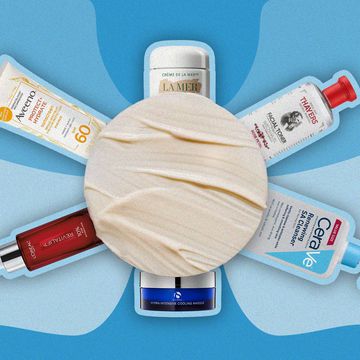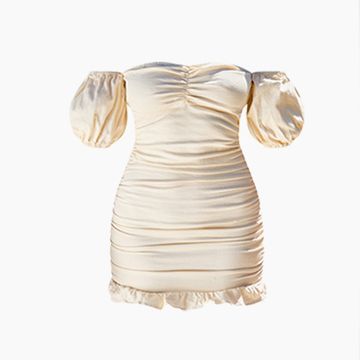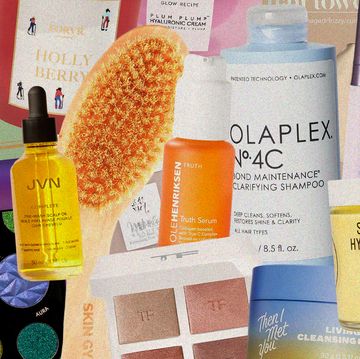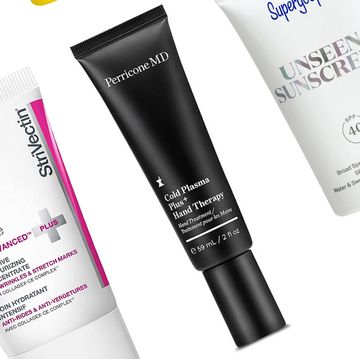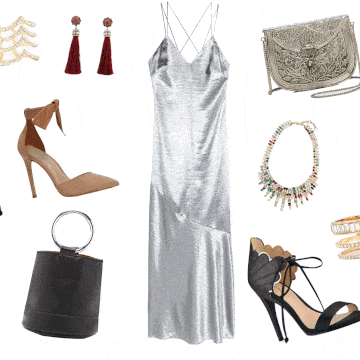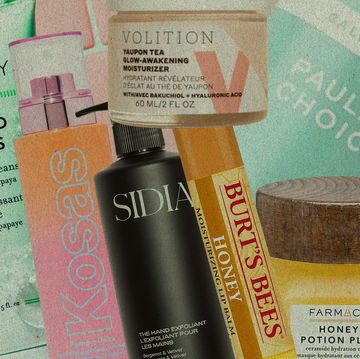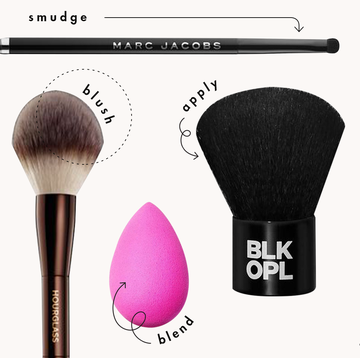Rules are meant to be broken — especially when it comes to beauty. That’s the mentality driving Sharon Chuter, the Nigerian-born entrepreneur who is on a mission to create an industry where everyone can feel that they belong.
The 32-year-old trailblazer walked away from a comfortable job in the corporate beauty space after she realized the brands she was working for were not creating products that were tailored to a diverse-enough audience. She defined her mission, sold her house, and dove headfirst into launching her own brand.
Uoma Beauty was born in 2019 — a makeup brand that prides itself on moving away from beauty-industry norms. Since she was young, Chuter has faced obsolete and narrow ideals of what women should look like and because of this has had her share of difficulties in navigating the world of makeup. “My whole life I struggled with finding products that work for me,” she tells Shondaland. That, paired with her quest to create a space at the table for all, has fueled her into running own highly inclusive brand.
Chuter also recently launched Uoma by Sharon C, the affordable and drugstore-friendly sister brand to Uoma Beauty. While juggling her businesses, she’s also creating institutional change with movements like Pull Up for Change, an initiative that puts words into action by inviting companies to identify their total number of Black employees and the positions they hold. In partnership with Pull Up for Change, Make It Black, an initiative that is changing the vilification around the word Black by infusing money into Black businesses, has financially backed Black business founders while also highlighting the need for more representation in the business world.
Shondaland caught up with Chuter, who walked us through how she stays sane as an entrepreneur working 134-plus hours per week, her advice for those with the desire to try something new, and why the world needs to expand its idea of what “beauty” truly is.
NICOLE PAJER: How did you get the courage to start your own business?
SHARON CHUTER: There’s always a lot of risk. But to be an entrepreneur, you have to be naive. That’s the only way you can do it. If you’re not naive, you will always overthink it. It’s easy to start a business when you have nothing. It’s harder to do it when you are stuck, and you’ve enjoyed this beauty of fine wine and caviar. It’s very hard to give that away. And that was where I was. I was an executive. But I decided that I wanted to do something in my life that was more about purpose. I wanted to really be able to speak about the things that mean the most to me. At that moment, I was sort of like, “Okay, what am I gonna do?” But then the doubt crept in: “Oh, I can’t set up a beauty brand because why would anybody buy anything from me? I’m not a serious makeup artist. And I’m not Rihanna. I’m not a celebrity. Why should anybody listen to a paper pusher, in some sense, when it comes to makeup and beauty?” And I realized that that’s what we do to ourselves as women. We always tell ourselves that we want to be perfect before we attempt anything.
So, I embraced the life of “I don’t need to be perfect; I just have to try.” I knew that there was going to be a lot of learning and a lot of risk. But I didn’t care because that was what I wanted to do at that point in time, and I decided to go ahead and give it a go. I thought, what’s the worst that can happen?
NP: What were some of the bigger risks that you took along the way?
SC: One of the hardest things for me when starting my brand was getting funding. So, definitely the financial risk. I had to bootstrap for myself for a long time. This required selling my house. I put everything on the line. I was a few weeks away from going bankrupt before I actually got investment into my business. I was about to be panicking with like $5 in my pocket. But I was able to really forge through, and I’m really lucky that something came through. And the rest, as they say, is history.
NP: How do you manage the anxiety that comes with being an entrepreneur?
SC: Being an entrepreneur will definitely make you nervous. There are some days where you can barely breathe because you are faced with so much, and you just have to get through it. It requires an incredible amount of resilience. What keeps me going and what drives that resilience is why I do what I do. If you don’t have a strong “why,” there’s not enough bubble baths in the world that can help you get through what you face, especially when you become a successful entrepreneur. You’re growing, and you’re trying to juggle people and the process. And so, my why is what keeps me going.
My purpose is about equity. It’s about equality; it’s about creating a space where everybody can feel welcome. So, even on days where I’m tired and I want to sleep, these are the things that come into my head: “Girl, Malcolm X died; Martin Luther King died to give you the opportunity you have today. You’re going to go to sleep?” So, I don’t manage it through yoga or zen; I manage it through determination of the goal and impact of what I do.
NP: What are your current priorities in trying to create a more inclusive beauty industry?
SC: It’s an ongoing mission. It’s not like you’re the bigger guy; you’re the tinier player, and you keep challenging them. But I’m really proud of Pull Up for Change, the movement that I founded that changed beauty as it is. Beauty can never be the same again. The level of transparency and what consumers are expecting from companies has really expanded. It’s not just about including people of all colors and shapes; it’s who are these companies employing? Who has a seat at the table? How are we spreading financial wealth within marginalized communities? That really inspired and enabled thousands of consumers around the world to realize that they have power to enact change in a way that they never thought was possible.
My philanthropy and advocacy is always around equity. When we talk about inclusion in terms of saying, “Hey, include more people,” that is about making people feel like they belong. So, what I do through my brand is really the advocacy of belonging. But what I do sometimes through my not-for-profit is around equity, which is improving the economic well-being of Black communities all over the world. And that’s why through Pull Up for Change, we challenge companies, we hold them accountable, because they are the custodians of economic participation. If people cannot get jobs, they cannot build wealth or can’t even fulfill their basic obligations.
NP: I read that you currently work 134 hours a week. Is this still the case?
SC: I just launched a second brand, because I don’t like myself [laughs]. My business is barely just over two years old, and, between last year and this year, we did 10 times our revenue. It takes a lot to get these numbers. You cannot hire quickly enough for that. And so at this stage, so much is on you. You’re not going to have a handbook for every day. You are the handbook right now.
In March, we did a collaboration with Coming 2 America. Then in June, I launched a new brand. And so, that’s what’s driving those hours. It’s not going to be 140-hour weeks in 10 years’ time; it’s just going to have to happen at this early stage. I tell people, 99 percent of the world always looks at the top 1 percent and says, “I want what you have.” But to have that, you have to do what 99 percent of the world is not going to be prepared to do. And this is what it requires to do the hours that it takes to hold together a business that is going so fast and that is doing so many things and still having time for my advocacy and activism. There are only 24 hours in a day, and something has to give, and that thing right now is my sleep. But hopefully not for many years longer!
NP: Do you have one nonnegotiable self-care thing that you make sure and work in for your sanity?
SC: Friday night is my nonnegotiable. Nobody calls me until one o’clock on Saturday. Whether I’m awake or not, nobody calls me. I sleep from Friday into Saturday. That is me time. I usually wake up, walk my dog, wash him, and groom him. That brings me so much joy. And for the first time of the week, I get to watch TV. I catch up on Netflix. I watch documentaries, catch up on the news that I’ve missed, call my mom. And then one o’clock is work time again. So, that’s really the one day that I keep for myself. And everybody knows that even if the world is burning, it has to wait until after one o’clock on a Saturday.
NP: What are your thoughts on traditional beauty standards?
SC: They’re very one-sided. Beauty comes in every color, every shape, and size. How can you have an industry that is only churning the same thing over and over again because they’re only adamant that they want to serve one person? Well, guess what? That person you’re trying to serve is bored now. So, the more voices we bring to the table, the more creativity we bring to the table, the better.
Not only is the one-sidedness of the beauty industry destroying people’s image and self-love, but it also tells people of color, or people who are different, that they are left out. Let’s not forget that this is not an industry that just leaves out people of color; they also exclude people because of the size of your body, because of who you love. Beauty and makeup will not be the same without gay men and drag queens and the colorfulness and the flair that they bring into the industry. So, I think one of the things that the industry robs itself of is that excitement and that creativity and true innovation, because it’s been so monolithic in its definition.
NP: What do you hope that women take away from using your beauty products?
SC: I want them to fall in love with themselves, unapologetically. Just revel in themselves and how wonderful they are. I want everyone to look at themselves in front of that mirror and go, “Damn, I’m fine!” That’s what I want them to feel like — and not because of the makeup — because they are beautiful. So, I really want this to be that war cry for everybody in terms of taking charge of your own narrative and loving yourself for you. Because at the end of the day, everybody else is taken. It’s a waste to spend time self-loathing because of what other people say to you.
And that’s what my products stand for. They’re a symbol of self-love. And that’s why [I chose] the name of Uoma. Uoma means “beautiful” in my language, and everybody is beautiful.
NP: Do you have any advice for women who want to step out and be entrepreneurs or get into activism?
SC: Just start, and you’ll figure it out. But starting is the hardest part. You want to be an entrepreneur? Wake up one morning and say, “Okay, what can I do today?” Start up a website? Do that. Research how to do it. What are the opportunities to present that critical information about your strategy? Think about what motivates you the most. What cause are you the most passionate about? And just start. Start by posting on social media something about it; go read a book about something. Figure out local organizations already doing that work, and be a part of them. Nothing can happen unless you start.
I really didn’t have anybody to reach out to. A lot of the building of my brand was done via Google and Instagram. We’re living in an age of information. Everybody’s looking for a real-life mentor. Why should I have a real-life mentor when I can be virtually mentored by everybody? I read people’s interviews, I listen to people’s podcasts, and those little snippets start giving you an idea of what you need to do without the pressure of sitting down looking for somebody who’s going to help you or be your mentor.
NP: How exciting has it been for you to see the industry taking steps to become more inclusive?
SC: I’m extremely excited about the fact that we’ve seen the accountability that customers are putting on brands. And the fact that brands are responding to that. When the George Floyd trial was done, and the verdict was handed over within 10 minutes, beauty brands were posting about it. That would have been unheard of two years ago, because it would be considered political and divisive. So, I’ve really loved seeing those changes and seeing brands become more vocal and standing for something when the comments in the comment sections are very divided. Brands are choosing that it’s more important to be on the right side of history. Even though they’re doing it for commercial reasons, it’s still the right way to go.
We still have a long way to go for it to be genuine and authentic. Because, right now, a lot of things are about “How do I appease the customer because I know this is what they’re expecting from me?” But I’m hoping that we get to a point where we transcend that. It’s truly just a way of doing business where morality and ethics are not exclusive from profitability. And what we’re putting out to the world is that you can disrupt an industry and still be commercial. And that’s what I’m looking forward to seeing more of in the industry.
Nicole Pajer is a freelance writer published in The New York Times, AARP, Woman’s Day, Parade, Men’s Journal, Wired, Emmy Magazine, and others. Keep up with her adventures on Twitter at @nicolepajer.
Get Shondaland directly in your inbox: SUBSCRIBE TODAY



